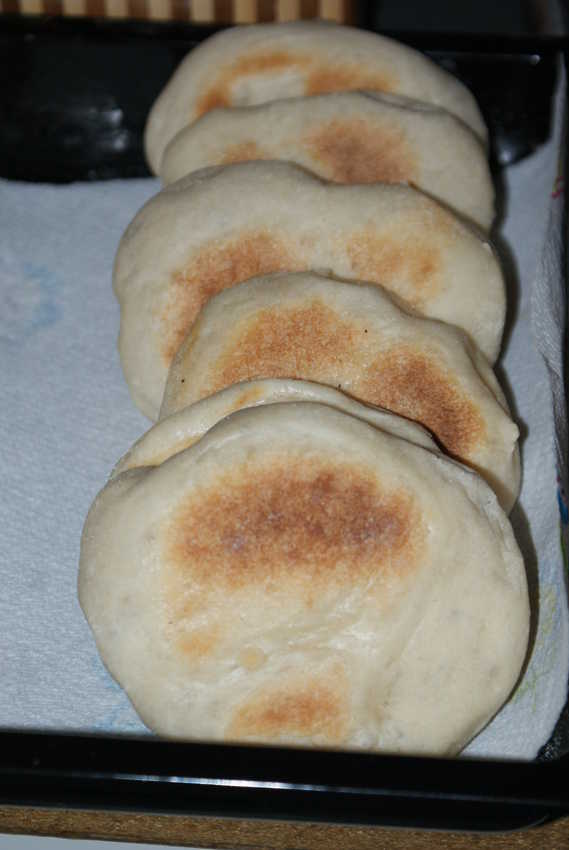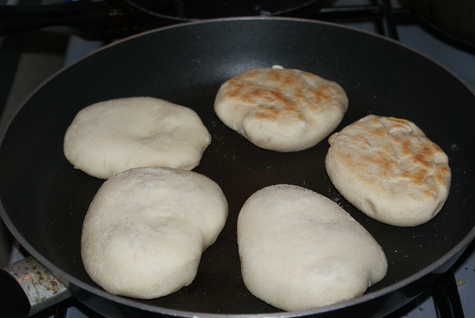English Muffins
English Muffins. Which is to say, muffins.
Not American muffins. Which are of course, cakes. Or ladies bits. Or possibly a sticky combination of both, I forget.
A vital ingredient of
Eggs Benedict and a handy little bread if you don't have an oven lying around.
The
first recipe is from
Making Fresh Bread -
a useful if slim volume of recipes and another of my Borders impulse buys in the days when there was a Starbucks
with a Borders around it handy for lunch breaks from my work.
It uses yoghurt as an additional leavening agent, which seems rather non-traditional but works well enough.
The
second recipe is a more traditional variant, taken from one of those delightful River Cottage Handbooks -
No. 3 Bread.
No. 3 Bread is by Daniel Stevens, one of the River Cottage cooks.
No 3. BREAD
Now you can recognise different types of muffins from quite a long way away.
English Muffins
bread veg
Makes 10-12 muffins
450g/1lb strong white bread flour, plus extra for dusting
½ tsp salt
1 tsp caster sugar
1½ tsp dried yeast
250ml/9 fl oz lukewarm water
125ml/4 fl oz natural yoghurt
vegetable oil, for brushing
40g/1½ oz semolina
Sift the flour and salt together into a bowl and stir in the sugar and yeast.
Make a well in the centre and add the lukewarm water and yoghurt.
Stir with a wooden spoon until the dough begins to come together,
then knead with your hands until it comes away from the side of the bowl.
Turn out on to a lightly floured surface and knead for 5-10 minutes until smooth and elastic
Brush a bowl with oil.
Shape the dough into a ball, put it in the bowl and put the bowl into a plastic bag or cover with a damp tea towel.
Leave to rise in a warm place for 30-40 minutes, until the dough has doubled in volume.
Dust a baking sheet with flour.
Turn out the dough on to a lightly floured surface and knead lightly.
Roll out to a thickness of 2cm/¾". Stamp out 10-12 rounds with a 7.5cm/3" biscuit cutter
and sprinkle each round with semolina.
Transfer the muffins to the prepared baking sheet,
put it into a plastic bag or cover with a damp tea towel and leave to rise in a warm place for 30-40 minutes.
Heat a griddle or large frying pan over a medium-high heat
and brush very lightly with oil.
Add half the muffins and cook for 7-8 minutes on each side, until golden brown.
Cook the remaining muffins in the same way.
To serve, split the muffins in half and toast lightly.
Alternatively, leave to cool and store in an airtight container for up to 2 days.
A more traditional recipe from
Bread
the River Cottage Handbook No. 3
English Muffins
bread veg vegan
Makes 9
500g strong white bread flour, plus extra for dusting
5g powdered dried yeast
10g fine salt
325ml warm water
a drizzle of sunflower oil, plus extra for coating
a handful of semolina flour, for coating
Mix the flour, yeast, salt and water in a bowl to form a sticky dough.
Add the oil, mix it in, then turn the dough out on to a clean work surface.
Knead until smooth and silk.
Shape the dough into a round, coat with a little extra oil and place in a deep bowl.
Leave to rise, covered with a plastic bag, until doubled in size.
Tip the dough out on to the work surface and press all over to deflate.
Divide into 9 pieces, shape each into a round a flatten to about 1-2cm.
Dust them all over with semolina flour; this gives a lovely texture to the crust.
Leave to prove on a linen cloth or wooden board, covered with a plastic bag, until doubled in size.
Heat a couple of large heavy-based frying pans over a medium heat.
Lay the muffins in the pans and cook for a minute or so, then turn them over gently.
Cook slowly for a further 10 minutes, turning every now and then.
You may need to adjust the heat if they seem to be colouring too fast, or not fast enough.
Alternatively, if you are using an Aga, cook the muffins directly on the warm plate for up to 15 minutes,
giving them a quick blast on the hot side at the end, if you think they need it.
Leave to cool on a wire rack.

